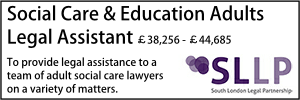Councils and Directors of Children’s Services support aims of Law Commission on disabled children’s social care, but warn of “unintended consequences” of some proposals
- Details
Proposals in the Law Commission’s review of legislation on disabled children’s social care risk damaging unintended consequences and maintain an ineffective tribunal system, the Association of Directors of Children’s Services (ADCS) and the Local Government Association (LGA) have said.
In a joint response to the review launched last October, the two bodies raised concerns about the right to redress for children with SEND via the tribunal system, which they described as “out of step with the arrangements for all other children in receipt of local authority help and support”.
They said: “We have significant concerns around extending the powers and jurisdiction of the SEND tribunal as a potential option to challenge and rectify decisions about disabled children’s social care.”
Research for county councils had found education, health and council leaders “believed that SEND tribunals had a problematic effect on the operation of the SEND system.
“While all recognised the importance of a robust and independent route for dealing with disputes, it was unclear whether the tribunal was an effective means of resolving disputes, given that its judgements would not alter the facts – for example, a tribunal might name a specific setting in an EHCP, but that did not alter the availability of places in that setting.”
The two associations concluded: “The tribunal system does not work, it is adversarial and drives additional cost throughout the system with no consideration to affordability.”
They also objected to consultation proposals to give specific rights to disabled children for access to advocates, or giving the Children's Commissioner power to initiate legal proceedings.
“There is a clear role for both advocates and the Children’s Commissioner when children are in care however we are unclear as to why these rights would need to be extended to disabled children in need of help and support,” they said.
Although many reforms proposed were welcome as they aimed to tackle a complex picture of legislation and guidance that has built up over many years, the associations said: “We do have concerns that some of the proposals in this consultation risk a series of unintended consequences that fail disabled children and their families.
“We are particularly conscious of the need to avoid repeating the mistakes of the Children and Families Act 2014 which, while well intentioned, ultimately led to a SEND system described by the previous government as ‘failing to deliver for children, young people and their families’ and ‘despite the continuing and unprecedented investment…not financially sustainable’”..
ADCS and the LGA had “significant concerns about removing the needs of disabled children from duties owed under Section 17 of the Children Act 1989 and establishing a new legal framework for this purpose”.
The initial aim of Section 17 had been focused around help for children, rather than protection, and disabled children should be supported under this section.
“It is worrying that the proposals suggest that a whole cohort of children are removed from Section 17 due to their disability and are assessed under a separate legal framework, and yet, depending on individual circumstances, children may still be owed a duty under the Children Act 1989,” the response said.
“This will lead to duplication and creates an even more complex picture for families to navigate.”
There was increasing emphasis in public policy on inclusion, and disabled children should be considered alongside other children in this.
“We recognise that some children and families have raised concerns that they feel they are assessed through a protection, rather than help, lens, and suggest that this is a practice issue rather than a legislative one,” the response said.
“A vast spectrum of need is met under the Section 17 duty, and this isn’t confined to issues of safeguarding, as indicated by the move to a system of Family Help.”
The Family Help approach would “allow a range of alternatively qualified practitioners to undertake assessments for children in need of help and support.
“It is not clear why all assessors of children with disabilities would need specialist training and development and there is a risk that such a requirement would be at odds with the government’s children's social care reform programme”.
The response also expressed concern about how these proposals meshed with reform in the SEND system and children’s social care.
“It is important that we avoid systems that act against each other, or set up ways of working that add complexity where it is not needed,” the ADCS and LGA said.
“Some examples of this include proposals around legislating for the skills and experience of assessors, and developing additional plans for disabled children.
“Children have multiple and multifaceted needs and therefore considering disability in isolation is unhelpful, any reforms need to consider how they interact with the wider system of children’s services.”
They also questioned whether the impact assessment for the commission’s proposals fully captured costs.
One option in the proposals said an increased number of social care assessments is likely to cost £8.24m, and additional costs of support as a result £14.45m.
“This breaks down to an average of around £155,000 and £272,600 per council respectively; we believe that this is unlikely to be enough to cover the additional costs, particularly if the impact of these proposals has anything like the impact on demand for assessment as the Children and Families Act 2014 had,” the response said.
Mark Smulian






































